#yes I’m aware that it’s because that’s how he looked in SOTN
Text
So I got a theory as to why Alucard went from this in the original show:
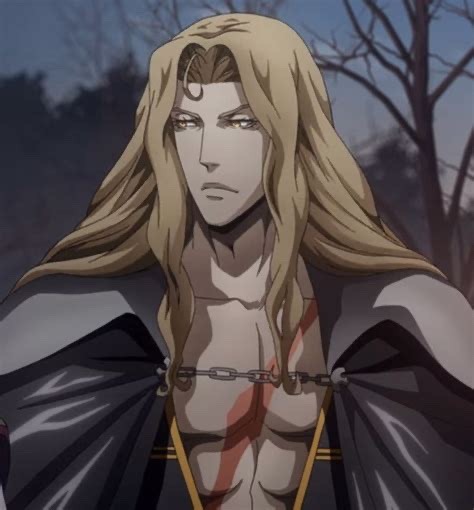
To this in Nocturne:

We’re shown in the first show that Alucard ages more or less like a human except much faster but even as an adult he’s still looks more like Lisa than Vlad. Well my theory is that eventually his human aging got to a point where he “died” and took on more of a vampiric appearance. Hence why his hair is white like an old man and why his skin is ghostly white like his dad’s.
Further proof:
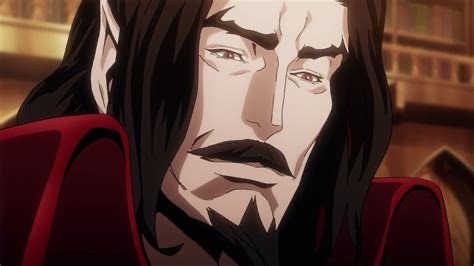
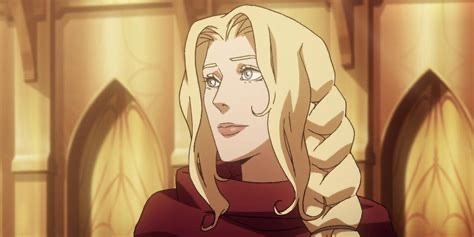
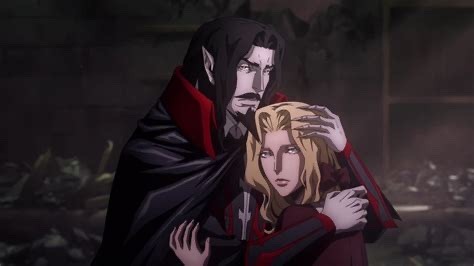
Like look at Dracula, that man pale as fuck
#castlevania#castlevania netflix#castlevania nocturne#alucard#adrien tepes#count dracula#vlad dracula tepes#lisa tepes#symphony of the night#yes I’m aware that it’s because that’s how he looked in SOTN#let me have my fun#theory
1K notes
·
View notes
Note
Additionally, your thoughts on Dracula and Adrian from the Netflix adaptation of Castlevania? I find Dracula really tragic, and the ending scene of Season 2 crushed me because I was not expecting Adrian to cry. He’s usually so stoic and calm that I didn’t think he would weep, I expected him to just shrug it off like heroes usually do, but no, when given time to process everything, the first thing he does is break down into tears. Sypha was right in calling him a brooding teen in an adult body.
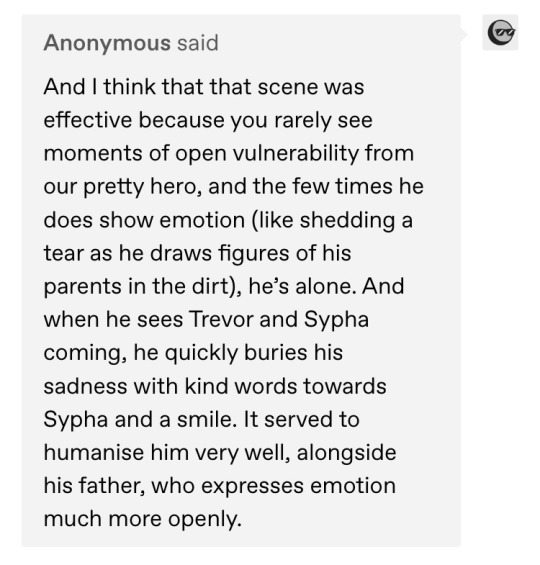
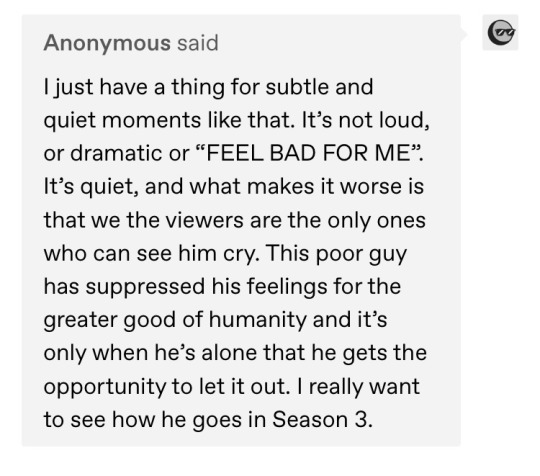
Ohh man. If you just take a look at my writing blog (or anywhere I post my fanfiction) it’ll become pretty clear pretty quickly how I feel about them XD So far all my Castlevania fics have been about the Tepes Family. Adrian and Drac are my favorite characters in the series!! (Though I do love pretty much all the characters in it.)
YES YES YES!!
They did an incredible job making Drac sympathetic and tragic. I don’t know if you know anything about the games, and granted, they couldn’t put a lot of story stuff in the games, but (at least as far as I’m aware) in most of them it’s like “ya, he was an evil dude who did evil things because he was evil.” So it actually would have been pretty accurate to the source to make him just an unsympathetic, irredeemable villain, but they didn’t and I LOVE them for it. Playing Symphony of the Night (Alucards game) after watching the series l was almost longing for that Drac I know and love from the series, (though it’s fun to see evil Drac too).
As I’ve said, I adore redeemable villains, and they did an amazing job with him, to the point where pretty much everyone in the fandom adores him, which is extremely tough to accomplish—even if you write a redeemable villain well, often large parts of the fandom don’t see it and hate the character. I knew that the point was that they were going to defeat Drac but I have to say, especially since I originally knew nothing of the games, I was hoping they’d save him by the end.
I think the fact that he liked and was kind to Hector and Isaac was evidence that he wasn’t too far gone. I mean, the only two people he genuinely trusted and liked in his court were human…that’s so interesting, I wish it was at least talked about, either in the show or in the fandom. I think he actually liked humans, partially or especially because of Lisa, he just...was so angry, and needed someone to blame. He probably ultimately blamed himself for not being there to save her, and it was just easier to blame the humans he once hated/didn’t understand, even if in reality he didn’t hate them as much as he thought he did...
Doing more thinking and research into the show for my “If These Walls Could Talk” fic I recognize now that symbolically it made sense even within the show that he died when Lisa died (which I can explain more about if you want but id probably end up going off on a long tangent so I’ll save it)...but I still thought practically, in the show, he could have still been redeemed.
Omg I LOVED that. The longer I take to sit with it, the more I realize just how much I loved that they put him crying instead of shaking it off.
It’s very interesting that Drac and Alucard are more openly emotional characters. I might be totally wrong, but as far as I remember, they (...and Lisa when she dies, and probably Isaac in a flashback), are the only main characters we see openly cry. It’s a pretty bold move to make any of your characters emotional like that, but especially your villain, and your bold handsome hero. It’s sooo easy to get emotional characters and emotions wrong…or just offputting to some people...but more on that later.
I think Adrian and Drac are both rather sentimental, in an odd way. Much of Drac’s motivations in the show and even in the games (the times his motivations are explained) had to do with his wives (yes he was married before Lisa in the games...unless Lament of Innocence was retconned...) which is interesting. So many of his decisions are based on emotion. He lets Lisa in just because he likes her, he goes to war with the world because of Lisa, he sits in his study mourning her loss, he let’s Alucard kill him… I also notice very often he digs his nails into his palms until they bleed, presumably because if he didn’t he’d hurt someone else (in the scene where he hurts Alucard, he does this). His sentimentality doesn’t diminish is power as a villain, which is SO difficult to accomplish.
I am emotional myself so I absolutely love to see emotional characters, but for most people, seeing even a normal character be emotional diminishes them in their eyes, or makes them whiny, so making your villain even a little emotional, and having that not take away from the audiences perception of their power as a villain is sooooooo hard to do, and I applaud them for making a so well-beloved, and still villainous and intimidating, but also emotional (at times) villain.
For Alucard. I don’t see any problem with him being emotional, but it makes even more sense if he’s a teen in an adult’s body—which was indeed portrayed quite well.
Yes that was interesting when he cried when drawing his parents!! I wasn’t expecting that when I saw him drawing them. I was enjoying and intrigued by his story so much, then when he started crying I was caught off guard—but in a good way. It really made me feel for him, and understand that he was still grieving his mother, and that knew the gravity of what he was currently doing.
I think it’s kind of important to show that kind of thing in a situation like this. It’s easy to think Alucard hates his dad, and they need to show the emotion of the situation to make it clear “no he doesn’t hate his dad, this actually breaks his heart, he just knows he has to do this.”
I loved when he was telling Trevor and Sypha about how much the world would lose by killing Dracula. It’s really interesting that he hides his emotion with them, and that Trevor and Sypha are so stoic. The son of Dracula isn’t the guy you expect to be the only hero who cries.
In “For Love” when Trevor’s like “Don’t get weepy about it” I was sitting there, sobbing, like “No, please get weepy about it! Let the boy cry for goodness sake!! Give me some emotion!!” But I too was not expecting him to cry like he did, and in grieving the death of his parents...
I knew the crying scene was coming because I’d seen pictures of it on here and pinterest, but I had no context for it. In the end it wasn’t just the weeping itself that made the scene so impactful, it was everything surrounding it. I didn’t know it would happen when he was completely alone (and would be for the foreseeable future), and in grieving his parents, or about the ghosts/flashbacks before it (cementing his grief), or that it was literally the last scene of the season, or that there would be no music for both the scene and the credits thereafter.
And that was what really got me.
Because, firstly, we never got to see any flashbacks to his childhood, and that was what I was begging for the entire series (and hence why its what I write about). To finally get it, and it not to just be something the audience gets to see, but something Alucard himself is seeing... a happy memory he’s seeing when he knows that is completely gone, he cannot hope to have it again, and for him to now be in his father’s place…that’s heartbreaking. Like just having your character cry—let alone those kinds of full-on sobs—is painful enough, showing a son grieving his parents is a particularly heart wrenching kind of sadness, but showing that he is haunted by memories of those parents he lost—not only lost but one of which he killed, and, if SOTN is canon for the show, the other of which he could have saved—of a happy childhood, and he is alone with these memories for the foreseeable future...that is truly heart wrenching.
Also the scene with Trevor and Sypha in the wagon earlier in the episode was super sweet, they could have easily put the Adrian crying scene earlier, and had the Trevor and Sypha scene be the last scene of the season (and Trevor’s game actually does end with them looking into the sunset, so ending with the last scene of “For Love” would be accurate as well), and left it on a positive note, and the audience would have been left with a completeness. But they made a conscious choice put his crying scene last, and it was so powerful, because it made you remember that at the end of the day, he isn’t just our bold handsome hero, he was a son who lost both his parents, and that, to him, this isn’t really a triumph, but a loss. It also kinda confirmed that Drac wasn’t an "evil guy, end of story". That there was reason to grieve him, and to show his son grieving, and to leave it there because of it. It was a personal gravity too
In the end, it was the lack of music in the scene, and even more so during the credits, so theres only his tears, and all you are left with in the end is this amplified emptiness that really did me in. I think I literally sat there, tear tracks on my face, my mouth open when I hit the credits.
Playing Symphony of the Night after watching the show is really interesting in exploring his character. I knew there was very little story, so I wasn’t expecting much from the story, but I actually found that I was beyond excited whenever there actually was some story, and the few lines they did say are stuck with me.
Maria comments early on that Alucard’s not very good at talking. At first I just chalked it up to...weird translations or whatever. But the more I played the game and the more I thought about him in the show...I think she’s right. He’s not very good at talking, yet if and when he does talk he’s quite eloquent, and precise with his words. (This actually makes him a somewhat difficult character to write). I wonder if perhaps this has some connection to his emotionalness. He’s very careful with what he says, and this may spread to what he does—such as being careful when he shows emotion. I’m curious why he’s like this. It could just be his nature, but I wonder if as a kid he was ever hated because he was a vampire—maybe people made fun of him, and he cried, and they made more fun of him because of it—and he learned both to hide his emotions, and that he had to be very deliberate and show people he didn’t mean any ill will with his words. (And he looks older than he is so people might call him immature for acting his mental age). All very speculative, of course. But it’d be fun to write about!
Also, another thing from SOTN that is related to this topic, there was a fight that really struck me (enough I actually wrote a fic about it (inverted recurrence)). SOTN takes plays 300 years after the events of The Netflix Series (aka Dracula’s Curse). Most of the bosses don’t seem to have a lot of meaning story-wise, they’re just there for you to fight. The other day I (Alucard) walked into a boss room...and there were Trevor, Sypha, and Grant (who was omitted from the Netflix series). They were fake versions of them, of course. And there’s no dialogue in the fight so maybe I’m just speculating, but what struck me was that the fact that Dracula could use them against him probably means he still cares about them, even after 300 years. It probably also means that they’re some of the only friends he’s ever had. Granted, he was asleep for a good chunk of those 300 years, still. It goes back to that sentimental-ness I was talking about earlier.
I few years ago I watched the Gravity Falls commentaries, and from them I got a lot of the writing advice I still think about and use today. Alex Hirsch said something on this subject which I really liked which is “Hold your tears.” When a character cries they’ve broken, that’s as far as they can go. So if you make a character cry when the audience themselves doesn’t feel the weight of the scene, or it doesn’t feel like the character has broken yet, it can feel like too...much/cheesy, and distance the audience. especially with cartoons where the way it’s drawn can actually affect your sympathy for the character (it can look weird or accentuated).
They did such an awesome job with this by literally holding his tears until the very end. I don’t know how other, non-emotional people felt about it, but Ive don’t know if I’ve ever seen tears used so well in a show, pack such a punch. To have it not just be a part of the scene but literally the focus, and at the end...it was powerful.
Sorry for the long response, and more importantly, I’m beyond sorry for taking so so SOOO long to respond. I hope you enjoy my response, if you see it <3
P.S. For anyone else who made it all the way to the end, I actually have a Castlevania sideblog now: @symphonyofthewrite !! I’d be beyond happy to recieve asks like this over there, if you’d like to hear more of my thoughts!!
#castlevania#castlevania meta#alucard#alucard castlevania#dracula castlevania#vlad dracula tepes#adrian tepes#adrian fahrenheit tepes#castlevania analysis#castlevania alucard#castlevania dracula#vlad tepes#emotional characters#meta#analysis#castlevania netflix#castlevania season 2#castlevania season 2 spoilers#castlevania s2#for love#symphony of the night#castlevania symphony of the night#castlevania sotn#sotn
65 notes
·
View notes